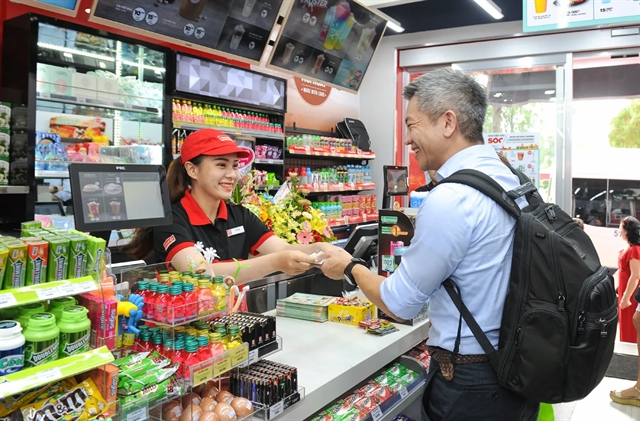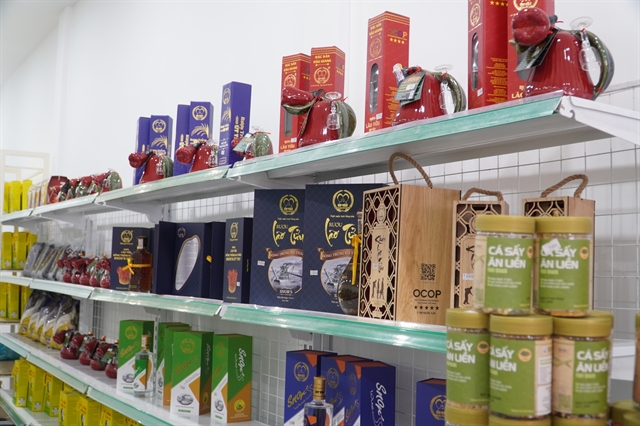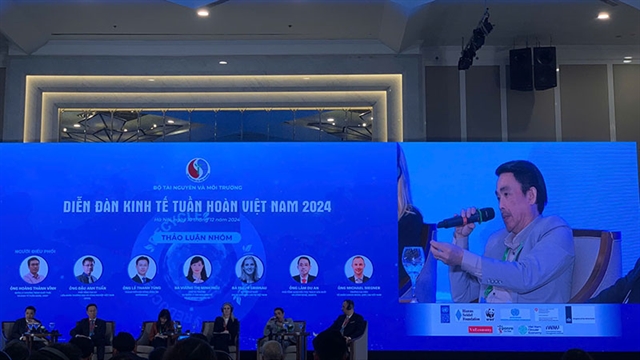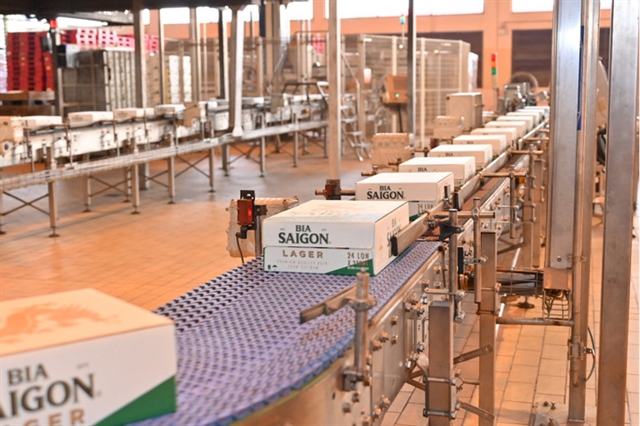 Economy
Economy


|
| Lâm Du An, Deputy General Director in charge of production at SABECO at the 3rd Việt Nam Circular Economy Forum (2024). VNS Photo |
HÀ NỘI — Promoting a circular economy through initiatives such as sustainable packaging, water management, and energy efficiency helps businesses, particularly Saigon Beer - Alcohol - Beverage Corporation (SABECO), reduce emissions, enhance competitiveness, and foster a green supply chain.
Speaking at the 3rd Việt Nam Circular Economy Forum (2024), hosted by the Ministry of Natural Resources and Environment on Tuesday in Hà Nội, Lâm Du An, Deputy General Director in charge of production at SABECO, said that the company is committed to innovation, strengthening partnerships with local communities, and investing in sustainable technologies. Together, these efforts will contribute to building a circular economy, reducing waste, conserving resources, and minimising environmental impact, ensuring a sustainable future for Việt Nam.
At SABECO and its subsidiaries, the company remains dedicated to producing high-quality beverages while adhering to a sustainable development strategy. The circular economy is a core element of this approach.
“By applying the principles of the circular economy, we offer a promising solution to minimise waste, optimise resources, and reduce environmental impacts, helping to spread sustainable development within the beer industry and beyond,” An said.

|
| A packaging line of SABECO. SABECO operates with a model focused on 100 per cent reusable and recyclable packaging Photo courtesy of SABECO |
SABECO operates with a model focused on 100 per cent reusable and recyclable packaging, with a goal of achieving 100 per cent biodegradable packaging by 2040. Notably, since 2019, SABECO has implemented improvements in product packaging design, reducing packaging weight, which has led to significant cost and material savings.
In compliance with the Environmental Protection Law on Extended Producer Responsibility (EPR), SABECO has partnered with PRO VIETNAM to promote the implementation of EPR, furthering the company’s sustainable development objectives and supporting Việt Nam’s green growth goals.
SABECO also collaborates with other members of the alliance to develop regulations and policies related to EPR, ensuring their effectiveness in the Vietnamese business context.
In 2024, PRO Vietnam aims to collect and recycle approximately 70,000 tonnes of packaging materials, raise awareness among consumers, and support workers in the waste collection sector.
SABECO has introduced over 50 water and energy management initiatives over the past five years, resulting in a 65 per cent reduction in water consumption during production. By 2026, the company aims to reduce water use by 75 per cent and return all wastewater to natural resources for treatment.
In 2024, SABECO successfully reduced its water usage to 2.86 litres per litre of beer, compared to 3 litres per litre in 2022 and 7 litres per litre in 2019. The company is committed to further improvements, with a target of 1.5 litres per litre of beer in the next two years.
SABECO has developed numerous energy management initiatives, with a target of reducing electricity consumption by 43 per cent, resulting in a reduction of approximately 65,000 tonnes of CO2 emissions. By 2026, the company aims to reduce energy use by 50-60 per cent, equivalent to 75,000 tonnes of CO2 emissions. Additionally, SABECO is expanding its use of renewable energy, with plans to source 50 per cent of its energy from renewable sources by 2026.
Currently, 12 out of SABECO’s 26 factories are equipped with solar power systems, which supply around 23 per cent of the company's electricity needs. The company plans to expand solar installations across all factory roofs, aiming to meet 37 per cent of its electricity consumption.
The irreversible trend toward a circular economy
The transition to a green economy and circular economy is an unavoidable and global trend, essential for achieving economic prosperity, environmental sustainability, and social equity.
An said the circular economy model has been successfully implemented in countries like China, Japan, and Singapore, presenting a valuable opportunity for SABECO to research and adopt similar strategies.
He told Việt Nam News that with the advancement of the fourth industrial revolution, SABECO is well-positioned to leverage scientific advancements in its circular economy efforts. By adopting a circular economy approach, the company helps preserve resources for future generations, contributing to cleaner air and a more sustainable environment, which will be widely supported by society.
He suggested that the Government should establish a clear legal framework that supports business growth, particularly in the circular economy which is associated with investment in modern equipment. To achieve this, preferential policies for businesses investing in the circular economy are essential.
SABECO's sustainable development strategy is built around four key goals: Country, Culture, Conservation, and Consumption.
Activities that contribute to national development focus on fostering and supporting the growth of young talents. These initiatives include assisting young entrepreneurs, supporting livelihoods, providing training, and enhancing the competitiveness of small and medium-sized businesses, as well as recognising and honouring outstanding workers.
Cultural preservation efforts aim to promote a healthy and active cultural lifestyle within the community, such as sports programs to improve physical fitness and cultural activities that enhance spiritual well-being.
Additionally, initiatives to promote a positive lifestyle are designed to raise awareness of healthy living, responsible drinking, and encourage a sense of community responsibility, particularly among young people. These activities also aim to inspire sustainable development by encouraging youth participation in environmental protection. — VNS




